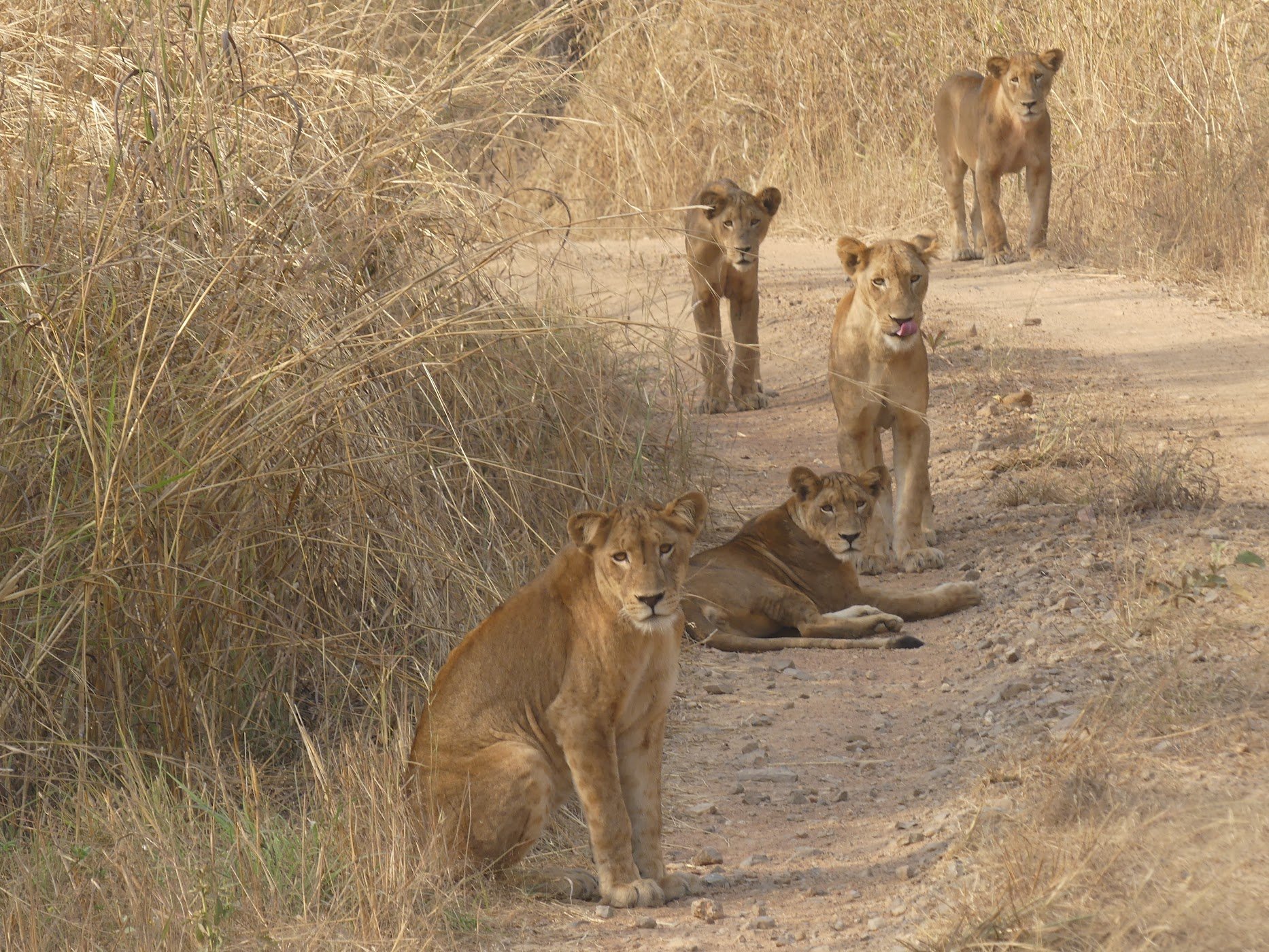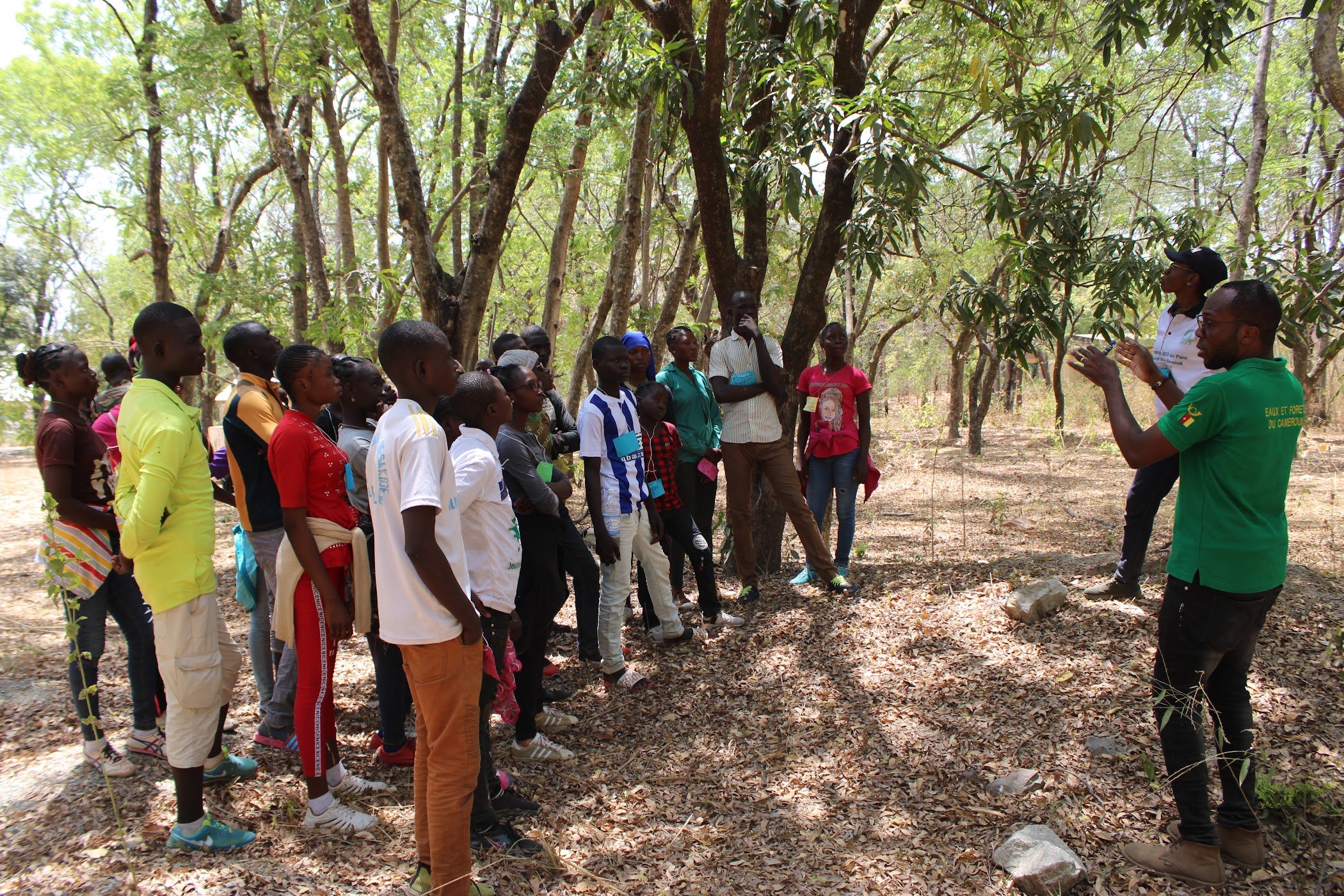Lions & Football - Saving Lion Strongholds in Cameroon
I had the absolute privilege to spend some time with Dr Kamgang and ask him some questions about his amazing work on behalf of Conservation Careers. I wanted to share his passionate story about his working with lions in the Bénoué ecosystem.
First, check out this video below with Serge talking about his word. It’s narrated by none other than DAVID ATTENBOROUGH!
The Bénoué ecosystem in northern Cameroon is the hotspot for lions in West and Central Africa. However in this area, which includes three national parks -- Faro, Bénoué and Bouba-Ndjidda and 32 hunting zones, only 250 lions remain across the vast 30,000 km² landscape,. The region has faced severe threats from habitat loss and poaching over the years. More recently, increased human migration to the area means an increasing number of livestock, illegal mining and habitat degradation within the ecosystem. This has caused human-wildlife conflict as lions encounter local herders and kill their animals.
Dr Serge Alexis Kamgang has dedicated his life to solving these issues and protecting the last remaining stronghold of lions in the Bénoué ecosystem, whilst promoting a coexistence with the local community. He is a recipient of one of this year’s Whitley Awards grants for his work through BEDD (Biodiversity, Environment and Sustainable Development www.bioedd.org), an NGO (supporting the government in biodiversity conservation in Cameroon) and the only lion conservation programme in the region.
Training lion guards.
Credit: WFN
How a passion for lions began
Dr Serge Kamgang grew up in Western Cameroon in a small village called Banka, surrounded by savannah ecosystem and mountains.
“Going to school, I would pass through landscapes where I would see wildlife such as antelope and Colobus Monkey. After I went to university and came back, I noticed that species were disappearing, and I started asking myself what happened to those animals and why were their habitats being destroyed?”.
With a passion to learn more about wildlife ignited, Serge chose to study conservation in university and took a role with primates, specifically chimpanzee and gorilla. After finishing a postgraduate degree in Oxford (2016), he continued working for Garoua Wildlife College and the National Parks Services in the Bénoué ecosystem. It was during this time that he discovered many threats facing lions including metal snares on their neck, prey depletion, habitat degradation and cattle encroachment. Serge was motivated to do something about it and set about forming his NGO, BEDD.
Serge and partners conducted the first lion survey in the area in 2015. The results showed that there were only 250 lions left in the Bénoué ecosystem due to habitat loss, poaching and a decline in prey. Added to this, an increase in lions feeding on cattle was causing conflict with local communities around Mbam and Kim region. To find solutions, Serge worked with the national parks to show communities how to protect their cattle against lions, for example by using fences known as Mobile Boma.
Working with the local community.
Credit: WFN
In 2021, Serge and BEDD received funding from National Geographic Society to continue to monitor the lion population in the ecosystem. “It’s a very large complex area that is about 30,000km2 and comprises three national parks and 32 hunting zones. Lions are moving around all these different parts and habitats. The area also has large local human populations, and these communities rely entirely on the biodiversity of the ecosystem.”
Promoting coexistence between lions and people and building trust with local communities
The human population in the area is growing and now exceeds 25,000 people. This means there are 100 times more people than lions and building a strong coexistence between them is a key priority.
Serge believes an integrated approach based on community is essential to conserving lions in the area, working with stakeholders and combining local knowledge with technology to mitigate the rising tensions. Serge, along with his team, work with these communities to train local people on how to protect cattle, implement nature-based solutions and to conserve biodiversity to improve the livelihood of communities.
Involving youth, educating and creating awareness about lions.
Credit: WFN
“Working with communities is very important because they have traditional ways to monitor biodiversity and wildlife. They have so much knowledge about species and where these animals are found. They know the land, the history and the animals better than any of us. Most of the time, a top-down approach for conservation does not work and we know that if we involve the community from the beginning, then we can guarantee the sustainability of a project by training the community so that when we leave, they can manage the wildlife themselves.”
Serge and his team will gather vital data on lion and prey populations using camera traps, local ecological knowledge and satellite collars. Community-based techniques are a vital part of Serge’s work to strengthen the capacity of park authorities through the training of Lion Guards. This involves training young local people who live in the villages to work with national park staff to monitor lion populations. They do this by using smartphones and photographs of different animal tracks so that the lion guards can compare tracks they see on the ground and match it to a lion track. This data is then uploaded on to a map to show all the areas where lions are present and to warn local communities and cattle herders if lions are in the area so that the area can be avoided.
“Our approach and strategy work well because we don’t have time to be in the field all the time. By training local people who live in the area, they can collect the data for us. We also provide them with a monthly salary, motorbike and all the equipment they will need to collect the data for us such as GPS, numeric cameras and mobile phones.”
A big part of the programme is building awareness through educational campaigns in the local communities to increase understanding about lion conservation. The lion
guards also have a role in their communities to spread awareness of the work they are doing. Serge’s programme will improve the knowledge of 1,500 stakeholders – including park staff, local government, and conservationists – on the importance, status and distribution of lions and their prey in the area to inform future management of the species.
Looking to the future, Serge envisions a world where the communities are intertwined with environment and natural resources. With his Whitley Award, Serge plans to:
1. Train 45 park guards and 6 community lion guards, who work together to monitor lion and cattle movements, and mitigate human-lion conflict and other pressures.
2. Improve the knowledge of 1,500 stakeholders on the status and distribution of lion and their prey in the Bénoué Ecosystem to inform future management.
3. Raise awareness of lion conservation among 30% of the local population through educational campaigns.
Dr Serge Kamgang
Credit: WFN
Inspiring the youth as the next generation of conservationists
As a lecturer and educator in the region, Serge not only recognises the importance of inspiring young people but actively includes them in his work by being a mentor for students and giving them opportunities to gain work experience to develop their skills in conservation.
“The advice I always give to young people is to work with conviction. Be honest and work hard and use that conviction in the best way to achieve something, improve its environment and do everything positively impactful.”
Gaining trust, respect and developing strong relationships with leaders of local communities are also important for Serge as it allows him to create more strategies for conservation. He is a key contact for the Cameroon Ministry of Forestry and Wildlife, advising on decisions making about lion conservation in Cameroon.
Using football to bring attention to lions
Lions are the national animal of Cameroon and the national football team are called the Indomitable Lions. But many people in the country, including the football players, have never seen a lion in the wild!
Cameroon’s national football team - the Indomitable Lions
Serge invited the men and women’s national football teams to come to the northern part of Cameroon to visit the lions in the national parks of the Bénoué ecosystem and to inspire them to conserve the species for which their team are named after.
“By doing this, we increased the visibility of lions in Cameroon and improved our ecosystem prospects. It is also a great opportunity to develop a sustainable financing mechanism for protected area management.”
The importance of involving women in the conservation conversation
Serge explained that more could be done in the area to promote women in decision-making.
“We are now trying to involve a gender approach to include women by helping to create associations and increase leadership so that women have a voice when we are developing approaches for sustainable solutions to biodiversity management in the area. That’s a big goal for us.”
Proudest moments
“I think recently being awarded a Whitley Award was a huge achievement for me! It’s helping me gain a profile, not only in Cameroon but internationally. It’s given me great opportunities, such as speaking to you! Now more people know about our work, and it will help me with people behind me do more. It’s given me the opportunity to continue our conservation projects in northern Cameroon and to conserve lions – for that I am very thankful. I’m so happy to be doing what I am doing.
Serge presenting in London as a winner of the Whitley Awards, known as the “Green Oscars”.
Credit: WFN
Find out more
Website:
www.bioedd.org
Facebook: https://web.facebook.com/BiodiversityEnvironnementSustainableDevelopement/ Find out more about Serge’s future plans and the Whitley’s Awards here.






